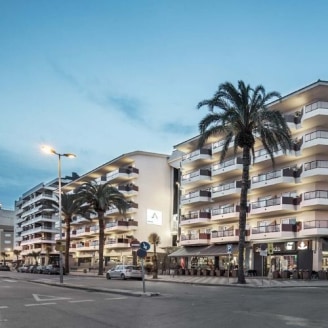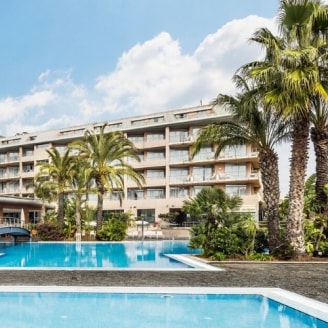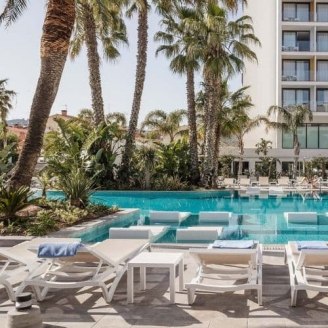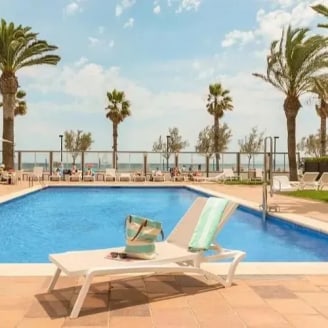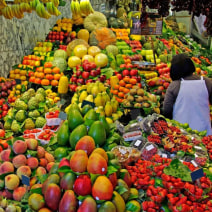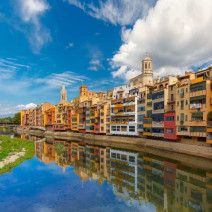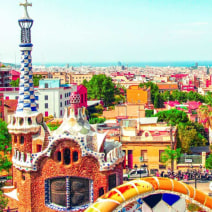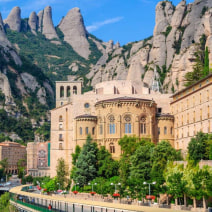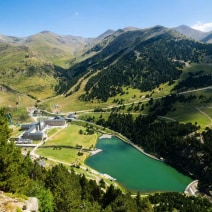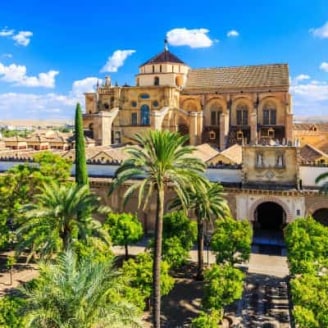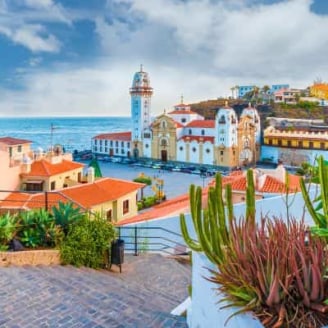Costa Brava Travel Guide
The Costa Brava is one of Spain’s most popular holiday destinations, known for its stunning beaches, historic landmarks, rich cultural heritage, and vibrant towns and cities. Located in north-eastern Spain, the Costa Brava is a coastal region of Catalonia, which has a population of over seven million people. Catalonia’s capital is Barcelona, and the region has two official languages: Spanish and Catalan.
Barcelona is packed with unforgettable experiences, from Gaudí’s iconic Sagrada Família and colourful Parc Güell to the medieval charm of the Gothic Quarter’s winding streets and historic churches. Tapas bars line the city, while Las Ramblas and La Boqueria market buzz with life. Beyond Barcelona, the Costa Brava offers more cultural gems. Girona’s Jewish Quarter and grand cathedral showcase its rich history, while Figueres is a must for art lovers, home to the Dalí Theatre-Museum. Montserrat’s dramatic peaks shelter the 10th-century Benedictine Abbey. If you’re staying in Roses, a scenic train ride into the Pyrenees promises breathtaking views and adventure.
We've outlined some useful information below to help you plan your next holiday to Costa Brava.

Time Zone & Currency
Spain is one hour ahead of Greenwich Mean Time (GMT) throughout the year. The currency in Spain is the Euro.

Weather In Costa Brava
The Costa Brava enjoys a standard Mediterranean climate. Expect it to be hot and dry during the summer months and mild during the winter.

Reading For Your Trip To Costa Brava
The Shadow of the Wind by Carlos Ruiz Zafón
Homage to Barcelona by Colm Toibin
Homage to Catalonia by George Orwell
Best time to go to Costa Brava
The Costa Brava is known for its sunny coastline and beautiful climate that brings heat and the sun to the region all year-round. In spring and autumn, days are generally warm and sunny with temperatures of around 20 degrees with cool breezes, making it an ideal time for sightseeing as well as relaxing without the high heat of peak summer.
Top Tourist Attractions In Costa Brava
Food & Drink In Costa Brava
A wide range of international and Spanish-style food is available on the Costa Brava, but do make sure you try some of the food local to the Catalonia region. Basics include pa amb tomàquet, which is simply bread or toast smeared with tomato, salted, and drizzled with olive oil. Fish is also widely enjoyed in this seaside region.
Some must-try dishes include:
- Suquet de Peix: A traditional Catalan fish stew made with fresh seafood, potatoes, tomatoes, and a saffron-infused broth, perfect with a glass of local white wine.
- Arròs a la Cassola: A rich and flavourful rice dish, often cooked with seafood, meats, or vegetables in a clay pot, allowing the flavours to deepen.
- Esqueixada de Bacallà: A refreshing salad made with shredded salt cod, tomatoes, onions, and olives, dressed with olive oil and vinegar.
- Botifarra amb Mongetes: A hearty dish of grilled Catalan sausage served with white beans, a classic combination enjoyed across the region.
- Crema Catalana: A regional favourite and a must-try dessert—this Spanish custard is very similar to a crème brûlée, with a caramelised sugar topping.
Among the many superb wines produced in Catalonia is the sparkling and refreshing Cava, which you can enjoy during one of your included excursions on this holiday.
Costa Brava Travel Guide FAQs
Can you give a brief history of Costa Brava?
Similar to other parts of the country, the Costa Brava region was under the control of the Romans, and you can still see some of their original structures in the Gothic Quarter of Barcelona. Then the Moors ruled between the 8th and 15th century. During the 19th century, Barcelona became the centre for the resurgence of Catalan nationalism known as the Renaixenca. A Catalan Republic was proclaimed in 1931, but after the Spanish Civil War (1936-1939) when General Franco's fascist regime took over the country, Catalan nationalism and its movement was oppressed. After the death of Franco in 1975, Catalonia regained its autonomy, but even today there is still contention around achieving full independence from Spain. The name Costa Brava means 'wild or 'rough coast' was coined by the journalist Ferran Agullo i Vidal in 1908. Artists like Dali, who was from the Costa Brava town of Figures, and Picasso, whose formative years were spent in Barcelona, helped to give the region a more bohemian reputation. In the 1950s, the Spanish government recognised that the Costa Brava had great potential as a destination for the growing 'package holiday tourists.' Barcelona hosted the 1992 Olympics, which helped to further signify the end of fascism in Spain and highlight the modern transformation of the Catalonia capital.
I have walking difficulties, is a holiday on the Costa Brava suitable?
Generally, the areas around the hotels on the Costa Brava is well suited for those with walking difficulties, with wide, open, flat promenades and most facilities such as the beach being located a short walk away from the hotel. However, the excursions involve periods of walking, and Girona, Montserrat and Barcelona do have some cobbled streets and hilly areas. Therefore, a reasonable degree of health and mobility is required. For all our tours we have an activity level guide to help you decide which holiday suits you best. For specific advice regarding our Costa Brava holidays and to discuss any special needs, please contact us directly and we will be happy to assist.
Is the Costa Brava a good holiday destination?
The Costa Brava is an ideal holiday destination if you are looking to combine a relaxing stay on the beach with experiencing the culture and sights of Catalonia. From the cosmopolitan city of Barcelona and smaller historical towns like Girona and Figures, the Costa Brava has it all.
Costa Brava Travel Advice
- For up-to-date information regarding entry into Spain please see: www.gov.uk
- Official Costa Brava Tourism Board: www.costabrava.org
